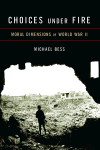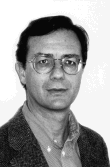- Categories:
Facing the Moral Questions of Global War
 Historian Michael Bess is too young to have lived through the global conflict that created the ethical dilemmas he scrutinizes in Choices Under Fire: Moral Dimensions of World War II (Knopf). But tales told to him in childhood by both his parents planted the seeds for this 21st-century work.
Historian Michael Bess is too young to have lived through the global conflict that created the ethical dilemmas he scrutinizes in Choices Under Fire: Moral Dimensions of World War II (Knopf). But tales told to him in childhood by both his parents planted the seeds for this 21st-century work.
"My mom was Italian," the author said recently from Tennessee, where he teaches at Vanderbilt University. "She grew up in Fascist Italy [and] was 20 years old when the war began.... Her family was basically divided by the war, because her father -- my grandfather -- was a member of the Italian Fascist party. He was the Fascist mayor of this little, rural town where they lived, and by all accounts, was a very sweet man -- a pharmacist, and a good man, but completely nave politically. He believed everything that he was told by the propagandists. And his two daughters, who had gone to university and had acquired a much more sophisticated understanding of how the world worked, used to argue with him.
 Michael Bess |
"My mom used to say that she would be disinherited every night at the dinner table, and then, of course, the next day everything was forgotten, and they went about their lives as usual," Bess continued. "But it ended up that she was carrying messages for the anti-Fascist resistance, on her bicycle, during the war, at the same time her father was a Fascist official."
After the war, Bess' mother moved to London, where she met his father, an American correspondent who answered her ad offering tutoring in Italian. The senior Bess in later years also told a story that stayed in his son's mind, and which Michael Bess recounts in Choices Under Fire: In 1950, as Donovan Bess dined in a Hamburg restaurant, a coldly smug waiter pointed to Germany's postwar prosperity and dared his customer to answer: "Who won the war?"
Describing his childhood as a "trans-Atlantic existence," Michael Bess explained, "I sort of grew up half the time in [Northern] California and half the time in Europe ... where I have gazillions of relatives." Bess spoke Italian in the home, and also learned French, which, he noted, "Naturally oriented me towards European history."
But it took a while for Bess to discover his field: "I think I can safely say I never took a real history class until I got to graduate school at Berkeley." Once he did, in the early 1980s, he began to encounter some of the complexities he would explore in his future work.
"One of my professors said, 'You have to read this book' -- and gave me Philip Hallie's [Lest Innocent Blood Be Shed: The Story of the Village of Le Chambon and How Goodness Happened There (Harper & Row)]," Bess recalled. "Well, it just so happened that when I was 16 years old, my mom had decided that it would be a healthy thing for me to spend a year in France ... So I spent a year in an international college in Le Chambon ... happily absorbing French culture.
"Never at any point did I learn what had been going on 30 years before in this village," said Bess, of the French inhabitants who saved Jewish families from Nazi persecution. "Nobody ever told me... I think it was out of humility: they didn't want to brag about what they had done during the war; they considered it to be ... what any decent person would have done. So it was possible for me at age 16 to live for an entire year among these people and never to find out they had saved 5,000 people's lives."
Personal experience combined with academic study to make Michael Bess a person "interested in possibilities of tremendous ruptures in human history," he said, "that would be caused by our own behavior, our own choices, at some level."
His first book (Realism, Utopia, and the Mushroom Cloud: Four Activist Intellectuals and Their Strategies for Peace, 1945 - 1989) explored the dangers of nuclear war and the growth of peace movements during the Cold War. His second (The Light-Green Society: Ecology and Technological Modernity in France, 1960 - 2000) examined the possibility of environmental collapse.
Now comes Choices Under Fire, which shares certain themes and approaches with those earlier titles, but which proved (to its author's surprise) to be a much more personal work.
"It grew out of a class that I started teaching in 1998 on World War II," Bess said. "There was a need for a class like this; students were asking for it. There's a strong interest in the subject, among undergraduates. They just want to talk about it; they find stories of World War II fascinating."
Bess also noticed something else: "When I would come across a moral controversy, the students would visibly sit up in their seats; they seemed to be really grabbed by the more controversial aspects of the war: the decisions that were not cut and dried" -- matters such as the U.S.-British alliance with Stalin, and the dropping of the atomic bomb on Japan.
"The challenge for me," said Bess, "was to remain faithful to the black-and-white aspects of the war, so that I wasn't diluting the heroism or denying it; and so that I wasn't also losing sight of the sheer evil ... but also to get into the more ambiguous aspects: the places where the controversies have been so difficult that they're still not resolved today."
Just as his students were enthralled by these lectures, so was Bess himself engrossed in the composition of the volume that grew from them. "I'd sit down and start writing, it would be 8:30 in the morning. And suddenly I would look up -- and it's 1:30 in the afternoon, and my stomach is rumbling because I'm hungry; and five hours have gone by without my even being aware of it. I guess what I would say is, I ended up putting a lot of myself into this book, in that it feels like it reflects morally the type of searching -- or trying to be open to different points of view, but at the same time trying to reach concrete conclusions -- that I try to embody in my life."
The result was a book that its author expects will present arguments to anger people on both sides of the political aisle. Most controversial, he guessed, will be the long chapter on the bombing of Hiroshima.
"The conclusion that I reach, after going through all the different considerations ... is that it probably did save a tremendous number of lives -- especially when you count the Japanese lives that it saved. And this is going to be unpopular with people on the left.
"But there are also aspects of the same discussion that will probably anger people who are more from the right-wing perspective, who want to think of the dropping of the bomb unequivocally as the right thing to have done. But I argue that it was an atrocity."
Readers will reach their own conclusions, Bess knows. "But hopefully those conclusions will be more informed, and maybe more nuanced, than they were before they'd read that chapter." There's a website, www.choicesunderfire.com, inviting readers "to come and join the conversation" on matters that, Bess said, remain "hard and complicated and intricate and baffling still, after 60 years."
Oversimplification is dangerous, thinks Bess. "My hope is that ... this book will render the reader more accepting, more tolerant, of ambiguity and nuance in understanding the world that we live in today, and in terms of how we frame the choices that we face as a nation -- framing our public policy..... Ultimately, I think we are going to be much more successful ... in shaping our world in a way that is viable ... if we have a map that is true to the complexity of that world, rather than one that oversimplifies it."
Choices Under Fire is dedicated to its author's children -- a daughter, 14; a son, seven -- who, like Michael Bess, and his parents before him, will grow up in a time and place where choices are not always as simple as they seem. --Tom Nolan

